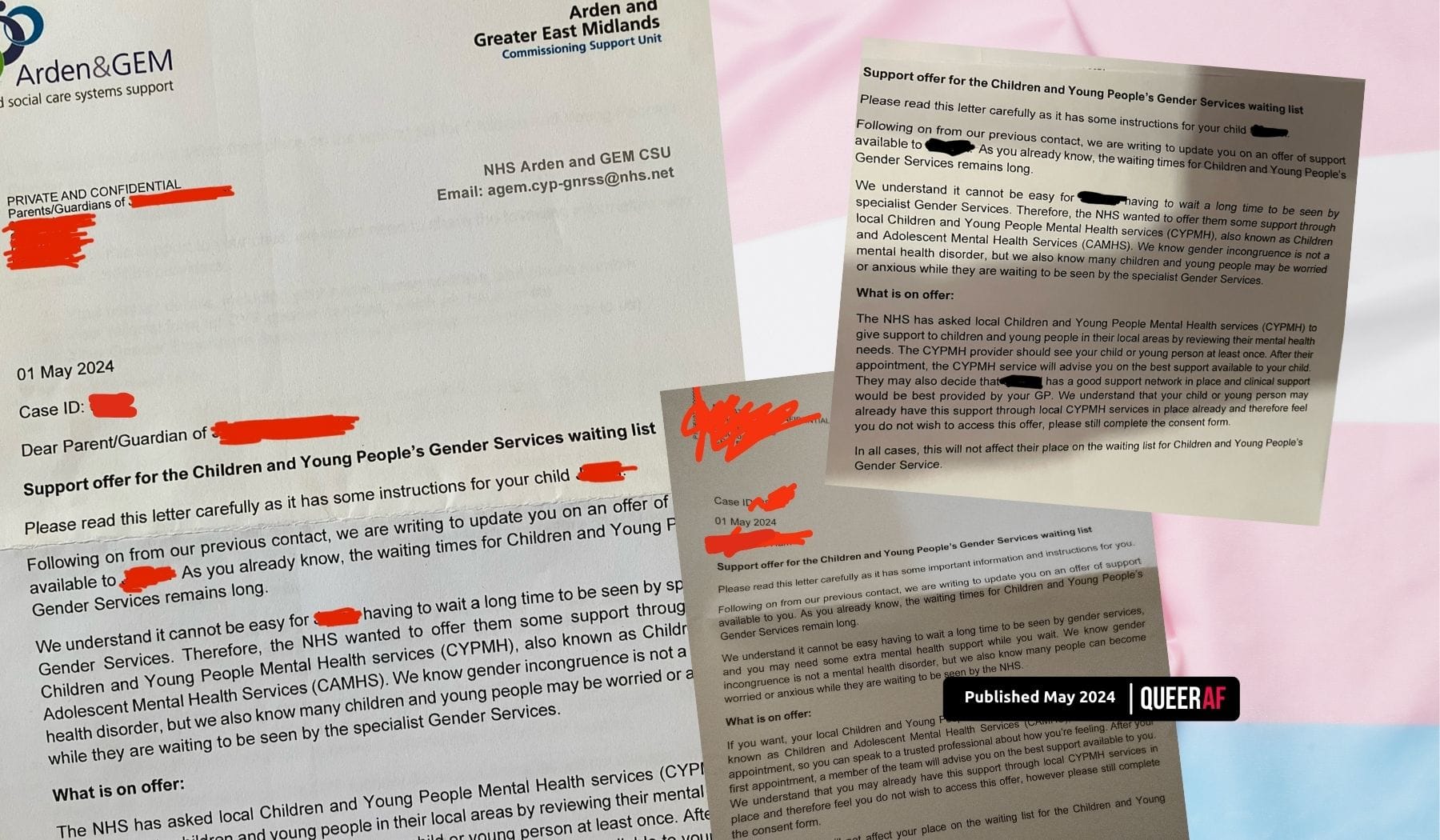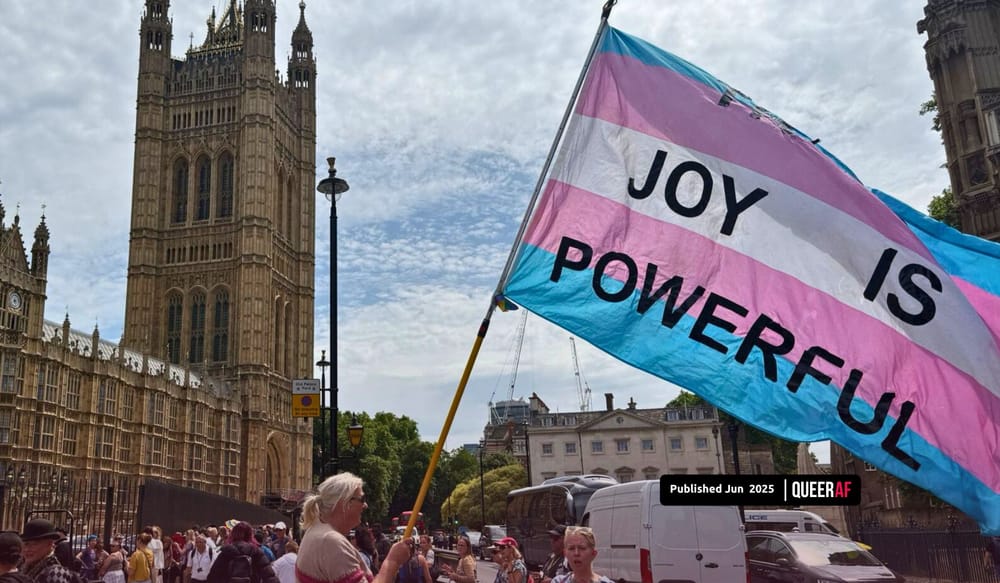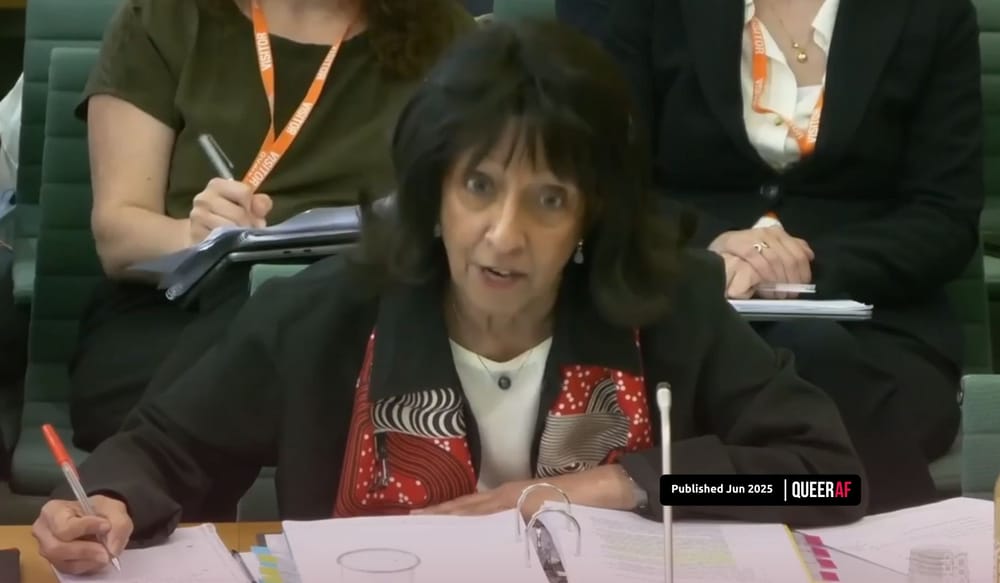TL;DR: In response to a call out from QueerAF, What The Trans and Trans Safety Network, parents and young people speak to us about their fears, worries and disgust that NHS England plans could leave some young transgender people with no choice but to medically detransition.
Let down, fooled, horrified and disgusted. That's how parents and young transgender people feel after they heard plans to offer "additional support" were paired with an information gathering process, which could lead to safeguarding referrals.
Two weeks ago, NHS England confirmed to QueerAF that some 6000+ transgender children were set to receive advice that may leave them no choice but to medically detransition or face safeguarding referrals.
The documents, first seen by the Good Law Project and confirmed by us as in use, say that young people and families using “unregulated” and “overseas providers” for gender-affirming care should stop. Families are warned that if they continue without “appropriate care” they may face safeguarding referrals.
The NHS is framing this approach as “enhanced mental health support”, which Good Law Project’s Jo Maugham KC told us is "duplicitous."
Letters seen by QueerAF, thanks to a joint call out with What The Trans and Trans Safety Network, show that parents and young people being invited to mental health assessments are not warned of the consequences of sharing details about their private care and use of gender-affirming hormones.
Parents share fears for their transgender teenagers
Ellen, the parent of a 15-year-old trans girl, told QueerAF that when she first got the email, she was "suspicious", adding that "considering Cass Review had just come out, I was very wary of the actual motives". She didn't respond.
Ellen's daughter, who has been on puberty blockers for 18 months, and "has never been happier" asked, "how on earth would threatening to take her away from her supportive parent if she doesn't stop taking them help her in any way whatsoever?"
Abi, who sent us copies of the letters and attached questionnaire, is a parent to three children, two of whom are transgender, said this "sneaky and underhand" process is "disingenuous - at best":
"It makes me feel unsettled that they are resorting to trickery in order to entrap and punish parents who affirm their trans kids. I feel heightened anxiety around protecting and affirming my trans son, and I have urged him to be careful who he talks to about trans healthcare," Abi told us.
"Both my son's trans identity and my role as a supportive and affirming parent are being weaponised by the media. This is legitimised by an openly transphobic and bigoted government which lacks compassion or insight into the lives of trans young people and their families. We just want to be left alone to love and affirm our trans young people."
A number of parents shared similar views with us, expressing their anger, distress and fears for their children, whom they want to support to live happy, affirming lives.
Young people are scared about losing shared care agreements
For the young people themselves, the moves by NHS England are instilling even worse feelings.
Morgan, a 16-year-old trans masc teen who emailed us with the support of their parent, says this feels like an attempt to "try and convince trans youth they are not actually trans but have underlying mental health conditions like depression, autism".
Morgan is also currently accessing shared care through their GP and GenderGP and is now "hugely worried that our GP will either get instructed to pull the arrangement or will get cold feet and pull it."
GenderGP is named in the documents seen by the Good Law Project as one of the “unregulated” and “overseas providers” that mental health assessments should look out for.
"I am concerned that the Cass Review and government will put into place policies or laws that make it impossible for me and people like me to use outside private places like GenderGP to start their transition.
"This would be, in effect, a death sentence for so many trans youth who rely on this service to fill in the gap that our country's health service cannot fill."
Meanwhile, as Rose, another young trans person, told us, giving young trans people on the waiting lists the chance to talk through their issues in a safe, non judgemental environment could be incredibly valuable. But "trying to take it away in an operation that masquerades as kindness scares me as to how far the government will go to remove access to essential care for young people."
An NHS England spokesperson told QueerAF this process is about putting in place "enhanced mental health support", and that it is optional and "whatever the outcome of their appointment with a mental health professional, their place on the waiting list for the gender service will not be affected."
Analysis: A "duplicitous" and "disgusting" process
This story sent shockwaves. Hearing from some 40 parents and transgender young people, who sent us letters confirming this plan was not only in place, but well into its rollout, was striking.
The consistent use of the duplicitous approach across multiple services all over England shows the coordination of a plan that was likely long-planned and timed to be initiated with the release of the Cass Review as justification.
We've already heard from parents who've faced safeguarding referrals for their support for their transgender kids, and now many more could face the same retribution for loving and supporting their children's gender-affirming care.

Information is everything.
It helps us reach and justify conclusions. But the information ecosystem is failing us.
When the Cass Review was released, news outlets highlighted the report's conclusions without taking time to consider whether the report could be flawed.
In doing so, it amplified and solidified to the wider public the report's key conclusions without balancing it against the evidence it excluded to reach them.
While much of the news media zoned in on that conclusion, trans activists, healthcare experts and the LGBTQIA+ sector combed through it line by line to show it was another official report captured by harmful, prejudiced rhetoric.
Crucially, despite a four-year process, it still failed to find any smoking gun of widespread regret among trans folks who transition. It instead had to rely on a methodology that allowed it to deem any data about how gender-affirming care helps trans people as too low quality. Whether your analysis means that led to it being ignored or excluded is by the by - it was downgraded.
It's not enough to know what the Cass Review says. We need to understand why it reached those conclusions.
When we do, we can see it for what it is rather than what it's been reported as.
At QueerAF, we'll always take stock - and deliver accountability journalism with our unique slow news approach, so you understand why.
We think that approach is essential so you have the information you need to fight back against anti-LGBTQIA+ rhetoric.
If you find it valuable, please consider becoming a QueerAF member and giving each month so we can deliver even more of it.











